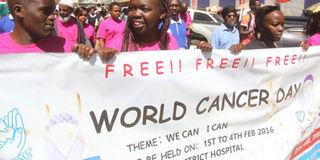Sh100 malaria drug could be used to manage colon cancer

Kenyans in Eldoret town mark the World Cancer Day on February 4, 2016. Colorectal cancer is the third most common cancer in men. PHOTO | JARED NYATAYA | NATION MEDIA GROUP
What you need to know:
- Currently, six drugs are being analysed by ReDo, an international collaboration between the Anticancer Fund, Belgium, and US-based GlobalCures.
- A study published in The Lancet shows that a weight loss drug called Liraglutide reduced the risk of type 2 diabetes by 80 per cent.
An antimalarial tablet can be used against cancers of the colon and rectum, a recent study shows.
Experts from two institutions in the United Kingdom — St George’s University of London and St George’s Hospital — are investigating whether artesunate, a common and cheap oral malaria drug that costs less than Sh100, reduces the multiplication of tumour cells and the chance of colorectal cancer spreading or recurring after surgery.
“We hope to see if a simple intervention with an established, off-patent and affordable antimalarial such as artesunate, taken for two weeks before surgery, can reduce the risk of cancer recurrence in patients with Stage II/III bowel cancer,” said Prof Devinder Kumar.
Colorectal cancer is the third most common cancer in men and the second most common in women, with more than a million cases reported globally each year.
Current treatments involve complex combinations of surgery, chemotherapy and radiotherapy.
Repurposed drugs are medications that have already been proven to be safe, and are used to treat a different condition from what they were made for. They sometimes provide a cheaper alternative to treatment.
This idea is driving a global project called the Repurposing Drugs in Oncology (ReDO), which seeks to repurpose widely-used non-cancer drugs that can control the disease.
Currently, 60 drugs have been listed for research. The idea is to identify the most promising medicines which are cheap, accessible and that have few side effects, for adaptation after clinical trials.
Most of these drugs are available in the country.
Currently, six drugs are being analysed by ReDo, an international collaboration between the Anticancer Fund, Belgium, and US-based GlobalCures.
The project has two main advantages: one, the drugs are well-known and researchers can draw on existing and detailed knowledge of their effects and their mechanism of action (pharmacodynamics), how the drugs move in the body (pharmacokinetics), and appropriate doses.
MORE EVIDENCE
Two, majority of the drugs being considered for repurposing are available at low cost or even as generics, unlike newer drugs that are more expensive.
A study published in The Lancet shows that a weight loss drug called Liraglutide reduced the risk of type 2 diabetes by 80 per cent.
The drug acts by reducing appetite in overweight people with ‘prediabetes’ — people with slightly increased blood sugar levels that, if untreated, develop type 2 diabetes, which is curable with exercise and a healthier diet.
Another repurposed drug is an indigestion medication called cimetidine, which can increase survival in colorectal cancer.
The drug treats indigestion by blocking receptors in the gut called histamine, which decreases the production of gastric acid.
The acid is known to cause a burning discomfort in the upper abdomen or below the breast bone, also called heartburn.
Using this mechanism, the drug also appears to block histamine receptors in cancer cells and supports the immune system’s defences against cancer.
However, Dr Paul Mwaniki, President of the Pharmaceutical Society of Kenya, says that while drug repurposing is an attractive option for patients with chronic illnesses such as cancer, sound evidence is needed from further research on the field.
“It is illegal to prescribe such drugs until such a time that research on them has been done to understand how they act against diseases,” he said.
“It is also important to discourage self-medication using these drugs because they can be very dangerous, or even fatal.”
Dr Mwaniki also cautioned that repurposed drugs cannot be an alternative to conventional cancer treatments such as surgery, radiotherapy and chemotherapy, and that a new treatment should only be given to patients after making sure that it is ethically sound and scientifically valid.
“The idea is to find the best and safest forms of treatment, but this will be problematic for Kenya because we have little resources to do studies on such drugs and this can only happen at the Kenya Medical Research Institute under funding from donors.”



